Influence of long-term sleep deprivation on the brain
Sleep is essential for the proper functioning of the brain and body.
When you go without sleep for extended periods, significant changes occur in both brain activity and specific brain areas.
The prefrontal cortex, the front part of the brain
The prefrontal cortex, responsible for cognitive functions such as decision-making, concentration, and problem-solving, becomes less active with sleep deprivation. This causes a decreased focus and more impulsive behavior.
Research shows that people with insomnia have less gray matter in parts of the prefrontal cortex. Areas at the left side of the forehead also function less well.
A specific part of the left front (Brodmann areas 9, 44-45) plays a significant role in insomnia.
With insomnia, the medial and inferior prefrontal cortex are less active. This activity recovers after sleep therapy, but not automatically.
Conclusions: Insomnia temporarily disrupts how the front part of your brain (prefrontal cortical system) functions during everyday tasks.
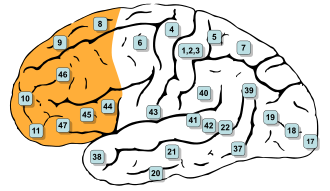
The limbic system, the emotional center of the brain
The limbic system, which regulates emotions, becomes unbalanced due to sleep deprivation. This can lead to mood swings, increased irritability, and the risk of anxiety or depression.
Sleep loss causes us to emphasize negative experiences, misinterpret facial expressions, and seek conflict.
Emotional volatility is partly due to impaired communication between brain regions. FMRI shows that in a properly functioning brain, the amygdala, part of the limbic system for emotional processing, is connected to the medial prefrontal cortex, which regulates emotions (e.g. calms us down).
Sleep deprivation breaks this link, causing an overactive amygdala to affect your mood.
Image below is the amygdala.
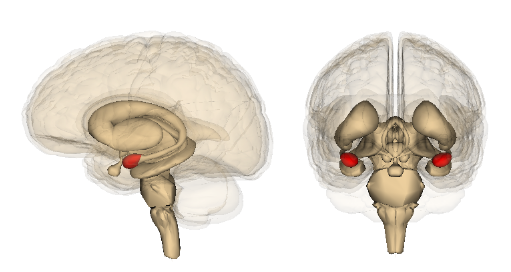
The hippocampus
The hippocampus is located in the temporal lobe. This part of the brain is important for your memory. It functions less effectively when you sleep poorly. This can cause you to forget things or even retain incorrect information.
Research shows that people are more likely to store incorrect memories after a sleepless night.
In short: you forget things faster. The hippocampus helps you learn new information, and your brain replays that information during sleep to remember it.
See the image below:

The thalamus
Research has shown that changes can occur in certain parts of the brain in people who suffer from insomnia. For example, this occurs in the thalamus and a specific part of the frontal lobe.
When you don't get enough sleep, you'll likely notice that it becomes harder to stay sharp and creative. Lack of sleep, for example, can affect how well you can switch topics in a conversation.
Studies show that when you're sleep-deprived, a part of the brain has to work harder, such as when you're trying to quickly come up with ideas or names for things. This indicates that your brain functions slightly differently to maintain good performance.
The thalamus is a key part of the brain that influences insomnia, sleep-wake cycles, stress, emotions, and bodily processes. Research has shown that changes in the structure and function of the thalamus can occur in right-handed people with insomnia or poor sleep. This has been confirmed by various brain scans.
See the image below:
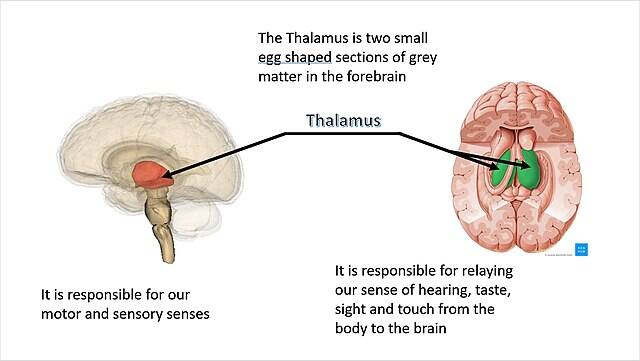
Reduced brain volume in the frontal, temporal, and parietal lobes
The temporal lobe, the brain region associated with language processing, is highly active in well-rested people, but inactive in exhausted individuals, which can result in slurred speech.
A study found that healthy adults who sleep poorly lose volume in the frontal, temporal, and parietal lobes.
Researchers don't yet know whether sleep loss causes shrinkage or vice versa.
Image below: From left to right: the frontal, temporal, and parietal lobes.
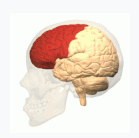
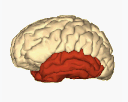

Pineal gland or epiphysis
The pineal gland is a small gland that is also known as the epiphysis.
Located deep within the brain, it plays a crucial role in regulating your sleep-wake cycle.
The pineal gland produces the hormone melatonin, which is responsible for signaling sleep.
Factors such as stress, exposure to blue light from screens, and irregular sleep habits can disrupt the pineal gland's function, potentially leading to sleep problems.
When someone lacks sleep for extended periods, melatonin production is disrupted, which can lead to a disrupted internal clock. This can not only worsen insomnia but also contribute to problems such as weakened immunity, mood swings, and even serious long-term health conditions.
Sleep deprivation and its impact on hormones
Long-term sleep deprivation also leads to an increase in stress hormones and a decrease in the brain's ability to remove waste products, which can be harmful in the long term.
During deep sleep, also known as the deep rest phase, your body produces a lot of growth hormone. This hormone helps repair cells, strengthen muscles, and promote growth, especially in children and teenagers. If you don't get enough sleep, your body can produce less growth hormone, which can affect growth and recovery.
Leptin and ghrelin are hormones that regulate your appetite and energy balance.
Leptin, produced by fat cells, signals to your brain that you are full. Ghrelin, the "hunger hormone," is released by your stomach and stimulates your appetite when you need energy.
Good hormone balance helps maintain a healthy weight and prevents overeating. Stress, lack of sleep, and unhealthy diets can disrupt this balance, which can lead to weight problems.
This indicates that sleep deprivation has far-reaching consequences for the brain and its functioning and emphasizes the importance of sleep for both mental and physical health.
The influence of sleep deprivation on neurodegenerative disorders and the impact of these disorders on sleep
Sleep disturbances are common in almost all common age-related neurodegenerative brain diseases.
Neurodegenerative disorders are characterized by the progressive loss of nerve cells in the brain, leading to various cognitive and motor problems.
Examples include Alzheimer's disease, Parkinson's disease, Huntington's disease, Lewy body dementia,
Multiple Sclerosis, and REM sleep behavior disorders.
See the list of all diseases linked below. These sleep disturbances are frequently linked to poorer thinking and memory performance. It is important to understand what causes these sleep disturbances and how specific parts of the brain are involved.
In neurodegenerative diseases, sleep disturbances arise from various processes in the body, depending on the specific disease. This can be due, for example, to problems with neurotransmitters in the brain, a disrupted sleep pattern, the accumulation of harmful proteins, or inflammation in the brain (neuroinflammation). Furthermore, the way the disease develops and personal factors also play a role.
As a result, sleep problems are often complex and vary from person to person.
Research shows that sleep problems, specifically REM sleep-related disorders, are important predictors of the disease.
In other words, sleep problems are often an early sign of degenerative brain disorders, and these problems often occur before overt symptoms become apparent. The research also suggests that sleep problems can contribute to the onset and worsening of these disorders. However, we do not yet fully understand this link due to several limitations.
Research using MRI scans to examine changes in the brain related to sleep can help understand how poor sleep and brain disorders are linked.
An image from a scientific study (see image below) illustrates the impact of sleep deprivation on various brain areas, with a specific focus on neurodegenerative disorders (known internationally as NDD). CNS stands for the Central Nervous System. The brain areas in this image are listed below.
MRI scans from this study revealed several changes in the brain. These include thinning of the cerebral cortex, reduced gray matter, loss of white matter, and damage to the nerve pathways.
Changes were also found in certain metrics, such as how well signals travel through the brain. Furthermore, there was a decrease in the connections between brain areas that work together (the default mode network), less collaboration between brain areas, and changes in the strength of slow brain waves.

- The basal ganglia
- The brainstem
- The cingulate cortex and gyrus
- The superior and middle temporal grooves (the groove in the temporal lobe)
- The superior and middle frontal grooves (the groove in the frontal lobe)
- The hippocampus and the subhippocampal groove
- The thalamus and the hypothalamus